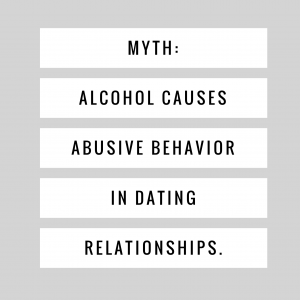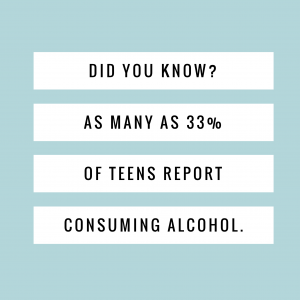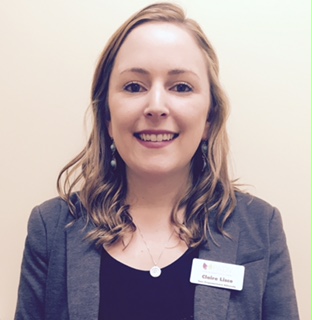Contributed By Claire Lisco
The use of alcohol and other substances has been linked to experiencing abuse and to being abusive in teen dating relationships. It is important to know that there are many myths that exist when it comes to the role alcohol and other substances play in teen dating relationships.
Myth 1: “Alcohol causes someone to be abusive toward their dating partner.”
 Dating violence is rooted in maintaining power and control in a relationship. Alcohol escalates and intensifies the cycle of abuse already present in abusive dating relationships; however, alcohol does not cause someone to abuse their dating partner, though it is often used as an excuse for abusive behavior. This sort of excuse on the part of an abusive partner is a tactic known as minimizing, denying or blaming abusive behavior on something else or on a dating partner. There are many other tactics involving alcohol that may be used to maintain power and control in dating relationships. For example, a dating partner may use peer pressure (e.g., “all the cool kids are drinking alcohol” or “come on, just try it one time”) to try to get their partner to drink alcohol. An abusive partner may also attempt to get their girlfriend or boyfriend drunk in order to be intimate with him or her, which is known as sexual coercion.
Dating violence is rooted in maintaining power and control in a relationship. Alcohol escalates and intensifies the cycle of abuse already present in abusive dating relationships; however, alcohol does not cause someone to abuse their dating partner, though it is often used as an excuse for abusive behavior. This sort of excuse on the part of an abusive partner is a tactic known as minimizing, denying or blaming abusive behavior on something else or on a dating partner. There are many other tactics involving alcohol that may be used to maintain power and control in dating relationships. For example, a dating partner may use peer pressure (e.g., “all the cool kids are drinking alcohol” or “come on, just try it one time”) to try to get their partner to drink alcohol. An abusive partner may also attempt to get their girlfriend or boyfriend drunk in order to be intimate with him or her, which is known as sexual coercion.
Myth 2: “Not many teens consume alcohol…those that do must come from ‘bad homes.’”
 While alcohol use among teens is certainly not “the norm,” a recent survey found that 33% of teens reported consuming at least one drink of alcohol on at least one day within the 30 days leading to participating in the survey (2015 National Youth Risk Behavior Survey). Within the same survey, as many as 18% of teens reported having consumed 5 or more drinks within a couple of hours within 30 days of completing the survey. It is important to understand that many factors impact a teen’s decision to drink alcohol; their peers and their community’s views and behaviors around drinking all play a role.
While alcohol use among teens is certainly not “the norm,” a recent survey found that 33% of teens reported consuming at least one drink of alcohol on at least one day within the 30 days leading to participating in the survey (2015 National Youth Risk Behavior Survey). Within the same survey, as many as 18% of teens reported having consumed 5 or more drinks within a couple of hours within 30 days of completing the survey. It is important to understand that many factors impact a teen’s decision to drink alcohol; their peers and their community’s views and behaviors around drinking all play a role.
How to Navigate Resources for Alcohol Use and Dating Abuse
Have conversations. Discussions between adults and teenagers about the ingredients of a healthy dating relationship is key! Part of this discussion can include how the presence of alcohol or substance use can negatively impact communication tools and conflict resolution skills necessary for healthy dating relationships. Such conversations can be integrated into health classes and related topics on alcohol and substance use or relationships at large. Check out Love Is Respect’s Educator Toolkits for middle and high school. Break the cycle also has helpful information for parents and teens to discuss healthy dating relationships.
Get support and share your experiences. Having a close family member, friend or dating partner who struggles with substance or alcohol abuse can be very difficult on an individual emotionally. If you or someone you know is in a relationship where alcohol or substance use is present among one or both partners, many resources exist to help with support for all involved.
- Alateen
 allows you to share your experiences and get support from other teens who are going through something similar. Unable to attend an in-person meeting or prefer digital communication? Sign-up for an Alateen Chat Meeting.
allows you to share your experiences and get support from other teens who are going through something similar. Unable to attend an in-person meeting or prefer digital communication? Sign-up for an Alateen Chat Meeting. - You can also get support via Loveisrespect.org. Talk with a trained peer advocate for emotional support and to ask about other resources needed specific to you or your friend by texting loveis to 22522, calling 1-866-331-9474 (TTY: 1.866.331.8453) or clicking on the “Chat Online Now” link at the top of the linked website.
Become a peer advocate against dating violence. Join national efforts to support your peers in engaging in fun and positive activities that promote healthy dating relationships. Below are just a few places to check out for ideas to this end.
- Join That’s Not Cool’s Ambassador Program or become an adult ally.
- Join Love Is Respect’s National Youth Advisory Board.
- Join Partnership Against Domestic Violence (PADV)’s Teens Against Dating Violence (TADV) Advisory Board. A new TADV Advisory Board launches with each school year.
Want to learn more?
- See a previous blog post that identifies some of the warning signs of abuse, how to get involved in your community to take a stand against abuse, and where to seek help if you or someone you know is experiencing abuse.
- PADV provides free prevention education programming on teen dating violence and healthy relationships to schools and youth-serving organizations throughout Georgia. For more information about PADV’s Teen Dating Violence Prevention Program or upcoming Teen Summit, visit our website www.padv.org or call (404) 870-9600.
 Claire Lisco is a Teen Empowerment Advocate with the Partnership Against Domestic Violence (PADV). PADV provides free prevention education programming on teen dating violence and healthy relationships to schools and youth serving organizations throughout Georgia. For more information, visit www.padv.org or call (404) 870-9600.
Claire Lisco is a Teen Empowerment Advocate with the Partnership Against Domestic Violence (PADV). PADV provides free prevention education programming on teen dating violence and healthy relationships to schools and youth serving organizations throughout Georgia. For more information, visit www.padv.org or call (404) 870-9600.
